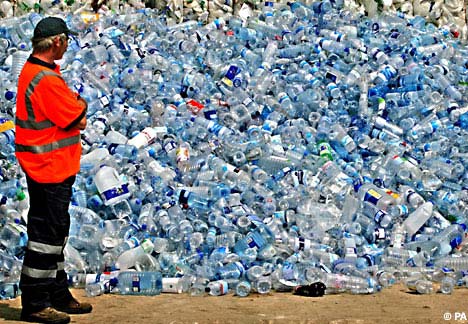Plastics and aggression of young girls
In a recent study of the effects of bisphenol A (BPA - a plastic additive) on humans, scientists have discovered another harmful effect: young girls exposed High levels of BPA infection show 'inward' behaviors such as aggression and hyperactivity.
The author of the study, published in the journal Envirronmental Health Perpectives, Joe Braun, Center for Global Public Health at the University of North Carolina (USA), said: 'We see women (among people). survey), people in the body have bisphenil A at detectable level, children, especially female sexes tend to act introverted '.

Plastic bottles are popular packaging for mineral water and non-alcoholic beverages.- Photo worldpress.com
However, some other scientists disagree with this conclusion, for example Steven Hentges, director of plastic impact studies at the American Chemical Council, representing the chemical industry. He said: 'The study has not given a causal link, but it is just a link between the two phenomena, even if it is' author's 'cautious observation'.
BPA is a chemical used in hard plastics and epoxy resins. Their products are often used as non-alcoholic beverage bottles, mineral water, food containers, pharmaceutical bottles and medical devices. BPA is also available in primers for cans. Most people get BPA through eating.
Previous studies have shown that over 90% of people in the US have detectable levels of BPA in their urine.
Previous studies have also concluded for animals that BPA adversely affects the neurodevelopment of fetuses and newborn animals.

Today's girls seem more aggressive - Photo: mirror.co.uk
According to Braun's study, 249 pregnant women in Cicinatti, Ohio were analyzed for urine in the 16th and 28th week of pregnancy as well as after 24 hours of birth. 99% of these women discovered at least one sample containing BPA. At the same time, the behavior of children born by them is also assessed according to the prescribed standards. The author has found an association between mother's BPA content and hyperactivity, even the aggressiveness in children is female.
That conclusion is only statistical, not explaining the mechanism of impacts (although this phenomenon is also observed in animal experiments). So Braun said, he only considered it a warning. He also recommends that manufacturers write on the packaging the product 'BPA-containing packaging' or 'BPA-free packaging' for consumers to choose.
- Young girls should not get pregnant
- Menopausal women are men who are young girls
- Out of tooth decay with mouthwash from young leaves of Hue students
- Chocolate anti-aging can help U50 women as young as girls
- Mushroom decomposes plastics
- Biodegradable plastics help reduce environmental pollution
- Produce plastics from fruits
- Turn egg shells into plastics
- Self-destructable wood from rice hulls
- From the age of five, girls are better than boys
- New material from natural substitute plastics
- Discover brain cells that determine the desire to cause aggression or sex
 Norway built the world's tallest wooden tower
Norway built the world's tallest wooden tower Kremlin
Kremlin Ashurbanipal: The oldest royal library in the world
Ashurbanipal: The oldest royal library in the world Decoding the thousand-year construction of Qin Shihuang shocked the world
Decoding the thousand-year construction of Qin Shihuang shocked the world